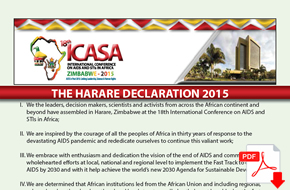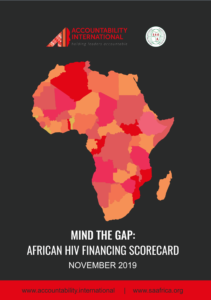General Resources
In the past 20 years, national governments, global funders and civil society have made significant progress in expanding access to life-saving antiretroviral treatment and prevention options in the fight against HIV.
Almost sixty percent of people living with HIV are now accessing antiretroviral treatment, and new infections have been reduced by almost 50% since 1996. But at the same time that great progress has been made, so we see that contributions by international donors have flatlined even though there is a US$5 billion gap in the resources needed to achieve the Joint United Nations Programme on HIV/AIDS (UNAIDS) 90–90–90 targets. These targets which are to diagnose 90% of all HIV-positive persons, provide antiretroviral therapy for 90% of those diagnosed, and achieve viral suppression for 90% of those treated by 2020 need to be achieved if we are to control the HIV epidemic. Currently, low- and middle-income countries contribute approximately 56% of the global resources for HIV, but the investment by countries varies and a significant 20% global funding gap remains, which leaves the HIV response in a precarious position.
As a result of this situation, in early 2019 the Society for AIDS in Africa began an evidence-based advocacy campaign that focusses on this resource gap that exists, with the aim of meeting the UNAIDS 2020 and 2030 targets in Sub-Saharan Africa.
As part of this campaign, a group of African and global HIV advocates and activists have developed a strategy for creating and implementing such an advocacy campaign. The campaign has developed this African HIV Financing Scorecard in partnership with Accountability International (previously AIDS Accountability International) as a means to analyse the existing funding, interrogate the gaps in required funding, and provides evidence-based advocacy messaging for action by the various stakeholders involved. The Scorecard tracks current country investments in HIV treatment and prevention in order to shed more transparency on the topic. It also examines existing frameworks and funding in general, as well as looks at the current use of innovative financing and what sources for funds might exist. The report then delves into partnerships with business and public-private partnerships and impact investment and the potential role these tools can play in financing the HIV response. The report also examines what corporate social responsibility programmes and individual philanthropists are currently doing to finance the response to HIV. Other sources such as diaspora remittances are also interrogated so as to create understanding on how they may be a potential source of finance.
The next section then goes on to look at the current situation in each country and how the countries are faring in their current HIV response. This provides both an indication of what has been done to date, what political will currently exists and what issues still need to be addressed. Identifying priority areas for funding is vital if funding will remain limited. This then also provides a starting block for a discussion on the cost to end the epidemic in each of the African countries. The report then goes on to examine current programme spending patterns, existing sources of health financing, and expenditure on clinical trials. The report also examines the role of International Development Partners and Civil Society, looking into a variety of HIV finance issues in that arena, such as international funding for HIV, finance for HIV research, loss of African funds to illicit outflows, funding of the Global Funds Country Coordinating Mechanisms and accountability around those grants. Next, we look into the state of transparency, openness and democracy in each of the countries as a means to locate the dialogue in the broader landscape of accountability, transparency and anti-corruption.
The report ends with findings from the research and a list of recommendations that were collectively developed during a workshop “Consultative >Meeting for Scorecard Validation on HIV Financing in Africa” held in Accra from 15th to 17th October 2019. These findings and recommendations inform the SAA campaign, as well as the work of others in designing policy reform and making the case for sustained and increased investment.
Increasing domestic investment on HIV treatment and prevention will require a regional coordinated, evidence-based advocacy campaign and partnership, and the Society for AIDS in Africa sees this African HIV Financing Scorecard as a first but critically important step in the broader campaign which aims to increase domestic funding for HIV programming. This program is well suited to SAA’s strength in policy analysis and advocacy as SAA is an independent organization devoted to transparency and accountability and whose work is respected by a wide range of global stakeholders. We hope that this research, our findings and recommendations provide evidence to start a discussion, across many stakeholders, on what and how we can sustainably, inclusively and accountably finance the final stages of the HIV epidemic in Africa.
- ICASA 2019 – 1st ISC Working Document – English
- ICASA 2019 – 1st ISC Working Document – French
- ICASA 2019 – 2nd ISC Working Document – English
- ICASA 2019 – 2nd ISC Working Document – French
- ICASA 2019 – Marathon Meeting Working Document – English
- ICASA 2019 – Marathon Meeting Working Document – French
Download ICASA Flyer – English
Download ICASA Flyer – French
SAA Newsletter – Print copy – English
SAA Newsletter – Print copy – French
Download – SAA eNewsletter – English
Download – SAA eNewsletter – French
Download – ICASA 2019 Quarterly Newsletter – English
Download – ICASA 2019 Quarterly Newsletter – French
Download – Francophone Women in Ghana – Lancet
Download – CSO Accountability Forum Working Document
Download – Report of 1st ISC Meeting ICASA 2019 Rwanda
Download – 6th Handingover Ceremony of the Society
Download – 6th Handingover Ceremony of the Society
The Society for AIDS in Africa (SAA) five-year Strategic Plan was formulated with substantial participation and support from SAA’s Administrative Council, key stakeholders, and partners. This is the third strategic plan since the inception of SAA. Download – SAA Strategic Plan 2017 – 2021
Download – FINAL ICASA 2017 NARRATIVE REPORT
Download – FINAL ICASA 2017 RAPPORTEUR REPORT
Download – FINAL M&E ICASA 2017 REPORT
- ICASA 2017 – 1st ISC Working Document – English
- ICASA 2017 – 1st ISC Working Document – French
- ICASA 2017 – 2nd ISC Working Document – English
- ICASA 2017 – 2nd ISC Working Document – French
- ICASA 2017 – Marathon Meeting Working Document – English
- ICASA 2017 – Marathon Meeting Working Document – French
ICASA 2015 – 18th International Conference on AIDS and STI’s in Africa.. ICASA 2015 – Abstract Book
TERMS OF REFERENCE FOR INDIVIDUAL CONSULTANT West and Central Africa’s (WCA) population is predominantly young. More than 64% are under the age of 24. Young people are a tremendous resource for the region – but their potential will only be realized when the right investments in their education, health, skills and empowerment are made… Download – Consultancy Open by UNFPA WCARO
The Society for AIDS in Africa (SAA) is hosting this scientific gathering during the first week of August, 2015, to discuss measures to pre-empt the spread of emerging viral infections in Africa following the recent devastating outbreak of the Ebola virus disease in West Africa. Such fora are in line with the need for constant vigilance as the African continent is quite vulnerable to viral epidemics with its weak health systems and socioeconomic challenges. Video Download – 3RD SYMPOSIUM ABSTRACT/ PROGRAM BOOK
We the leaders, decision makers, scientists and activists from cross the African continent and beyond have assembled in Harare, Zimbabwe at the 18th International Conference on AIDS and STIs in Africa; Download – The Harare Declaration 2015
18th International Conference on AIDS and STI’s in Africa.
Download – ICASA 2015 ABSTRACT BOOK
18th International Conference on AIDS and STI’s in Africa.
Download – ICASA 2015 REPORT
Download – ICASA 2015 POCKET PROGRAM BOOK
Download – Africa center for HIV and AIDS Management
Download – Key Date and Preliminary Conference Program
Download – SAA E- Newsletter 2014
Download – Executive Council Election Report – 2014
L’élaboration du Plan quinquennal stratégique de la Société Africaine Anti-SIDA a vu le support substantiel de son conseil d’administration, des acteurs clés et de ses partenaires. Ce plan d’actions, le deuxième du genre depuis la création de la SAA, met l’accent sur le système de gestion des conférences ICASA, le renforcement du secrétariat permanent et l’ouverture aux partenariats dans la mise en œuvre des programmes de la SAA.
Download – Plan strategique SAA disposition française
The Society for AIDS in Africa (SAA) five-year Strategic Plan was formulated with substantial support of the SAA’s Administrative Council, key stakeholders and partners. This action plan is the second of its kind since the inception of SAA. It focuses at enhancing the management system of ICASA conferences, and the strengthening of the SAA Permanent secretariat. The action plan provides equal opportunity for all stakeholders to actively participate in SAA program implementation.
Download – SAA Strategic Plan Layout Final English
The evaluation of the 17th International Conference on AIDS and STI’s in Africa (ICASA 2013) was undertaken by Foundation for Profession Development. Alet Bosman, FPD Technical Advisor: Evaluation, was allocated the responsibility of evaluating ICASA 2013 as Evaluation Project Manager. The Evaluation Project Manager would like to express her appreciation to all the individuals who were involved in the evaluation project: Mr Luc Bodea, Coordinator of Society for AIDS in Africa/ ICASA 2013 Project Manager Dr Gustaaf Wolvaardt, FPD Managing Director Mrs Liz Wolvaardt, External Consultant Ms Emily Blitz, ICASA 2013 Director The FPD Conference Secretariat The FPD Evaluation Unit Ms Frances Slaven, FPD Research Fellow Mr Ryan Martin, Volunteer Society for AIDS in Africa Secretariat (SAA secretariat)
Download – ICASA 2013 final M& E report
President’s welcome speech to ICASA delegates Speech of the President of the Society for Aids in Africa Theme: No more speech but call for Action! His excellency the President of the South African Republic, President Jacob Zuma ; Her Excellency the President of Malawi, President Joyce Banda, Her Excellency the first lay of Zambia, Mrs Christine Kaseba- Sata, The executive director of UNAIDS, Dr Michel Sidibe The Africa Regional Director for the World Health Organization, Dr. Louis Gomez Sambo, Her Excellency Nkosazan a Dlamina-Zuma, President of the… Download – SAA Newsletter 2013
Children and AIDS Compendium of Abstracts presented at the 17th ICASA in December 2013, Cape Town, South Africa… Download – ICASA 2013 Abstract Book
16th International Conference on AIDS & STIs in Africa 16ème Conférence Internationale sur le Sida et les IST en Afrique 4-8 December 2011 Addis Ababa, Ethiopia… Download – ICASA 2011 Programme Book


